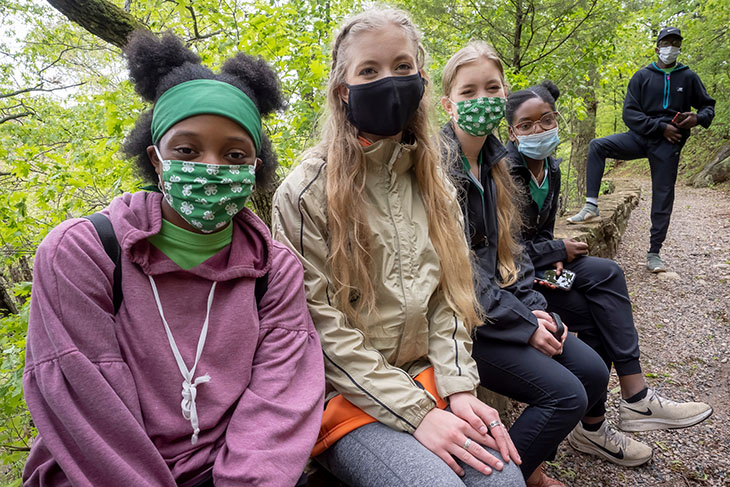
Oklahoma 4-H builds sense of community for youth and adult volunteers alike
Friday, June 18, 2021
Media Contact: Donald Stotts | Agricultural Communications Services | 405-744-4079 | donald.stotts@okstate.edu
Adult volunteers give time, energy and enthusiasm to the Oklahoma 4-H program, often starting because of their own children’s involvement but becoming role models and mentors for many other youth along the way.
Oklahoma 4-H has welcomed young people of all beliefs and backgrounds for more than 100 years, helping them learn how to express who they are, explore new interests, develop lifelong skills and grow a sense of community and public service, said Karla Knoepfli, Oklahoma State University Extension associate specialist for 4-H youth development.
“Volunteers enter into the 4-H program hoping to make a difference and provide a positive learning experience for members,” she said. “Along the way, they hone their skills in teaching, leadership, organization and communication that not only benefit 4-H’ers but transfer to other aspects of the volunteers’ lives, personally and professionally.”
A 2021 4-H Volunteer of the Year Award finalist, Kay County’s Susan Rhea has been volunteering for nearly a decade. She began when her eldest son joined the program. She confessed to feeling a bit out of her element during the early days.
“My husband was all about 4-H and showing pigs, but I grew up a sports kid,” Rhea said. “Who would have thought I would one day be chasing down the UPS guy for a semen shipment because we were wanting to artificially inseminate sows for a 4-H program? My knowledge about so many areas of interest has grown right along with my two sons as they participated and grew up in 4-H.”
Along the way, Rhea branched out to hone her expertise with a wide variety of animals, from cattle and pigs to rabbits and chickens. However, she is quick to point out that 4-H is about more than traditional agriculture projects often associated with the popular Extension youth development program, citing numerous food, nutrition and other learning experiences fostered by Oklahoma 4-H.
“One awesome experience was when our boys interviewed Oklahoma veterans and recorded the former soldiers’ life experiences to create a living history,” she said. “How great is that? The boys even got to be on TV, but it was really about the interaction with those who experienced firsthand what otherwise might have been largely overlooked by my boys as a line or two in a history book. It put a very human face on historical events for me as well.”
Pottawatomie County’s Linda Goodson likewise lauds Oklahoma 4-H’s ability to tailor learning experiences to the wide interests of its members and adult volunteers. Active in youth livestock activities since her own boys became involved in 4-H and started showing sheep, Goodson stepped into her current adult volunteer leader role when her now-grown sons’ children grew old enough to enter 4-H. She quickly determined that the local school – which her sons attended before her grandkids – was ripe for a strengthened partnership with the OSU Extension program.
“I’m a big horticulturist,” Goodson said. “It was kind of a dream to help children learn about the benefits gardening can provide to people and their communities. I secured funding that enabled us to build a classroom garden on the school grounds. Today, teachers bring their classes out into the garden, not only when we teach horticulture-related lessons but also to provide an enhanced learning environment in general.”
Goodson has had more than 50 4-H members enroll in her gardening project over a three-year period, which even continued remotely during the pandemic.
For David Ratcliff of Grady County, the relationships gained and kept over the years is one of the best things about being associated with Oklahoma 4-H. Get involved in Oklahoma 4-H and a person quickly realizes the many ways it helps build a sense of community, he said.
“Even if I’m not involved directly in helping lead a specific project area, I can still contribute as a chaperone – we need both women and men chaperones for trips, events and such – and interact with 4-H members and other volunteers that way,” Ratcliff said. “Most people are aware of what the presence of an enthusiastic adult can mean to kids. Friendships with other volunteers can mean just as much to adults involved.”
Suzanne Gilbert of Pottawatomie County is a good example of an adult’s own interests, knowledge and skills enhancing the learning experiences of members. She was a leader of the 4-H Horse Club when her eldest daughter was young, remained active in Tecumseh-area activities while her other daughter was in 4-H and maintains her active certified leader status to this day. Her grandkids are now Cloverbuds, how 4-H refers to programing for 5- to 7-year-olds.
In addition, Gilbert has volunteered to help with the International Youth Finals Rodeo in Shawnee for more than 20 years.
“Horses and rodeos are two of my passions,” Gilbert said. “There are just so many things a person can help kids become involved in as a 4-H volunteer. People talk about how the pandemic made them feel insulated and cut off. Well, 4-H can help you get over that – plus you get to work with some of the best youth in Oklahoma.”
Gilbert is involved with multiple projects as a donor and helps every year at the 4-H Banquet, said Sonya McDaniel, Pottawatomie County Extension director. McDaniel’s advice for adults who might want to become a volunteer – take the plunge.
“It’s a simple process,” McDaniel said. “Just come down to your local OSU Extension county office and speak with the 4-H program educator or county director. You really can make a difference. Just be prepared to have fun, and find yourself getting as much out of the program as you’re putting in.”
Contact information for OSU Extension county offices is available online.
